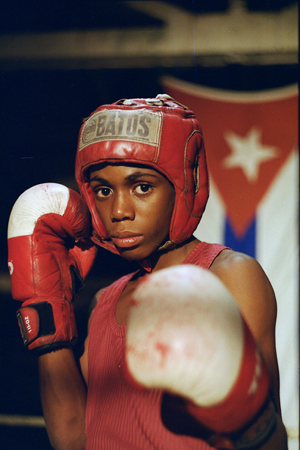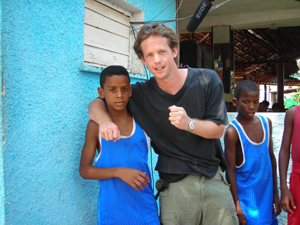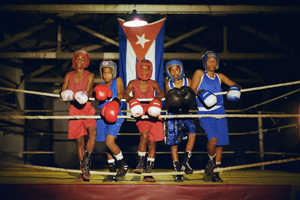
I spent the weekend in North Carolina at the Full Frame Documentary Film Festival and had the great pleasure of getting to see many inspiring and thought provoking films. Sons of Cuba was one of the highlights. It is a film about child boxers, who are training to be Olympic fighters in the last years of Fidel Castro's reign. The boys are in the under 12 league, their weights have to stay below 32kg (70 pounds) and they live at a state sponsored boxing academy. A boarding school for the poor, the boys eat, sleep and sometimes starve to box. Yet, the relationships that are portrayed within the film are extremely loving.

The young men have a pronounced expression of camaraderie and a very sweet, respectful and reverent attitude towards their mothers. In this film grown men also often cry and hug each other. Although the residents of Havana City seem to be in an unending state of poverty, there is no shortage of intimate community support. I had the chance to catch up with the film's director, Andrew Lang, a 28 year old Londoner, who spent most of his boyhood at an English boarding school. Although in his home away from home, he was not required to sleep under mattresses to loose weight or study revolutionary primers, he had a lot to draw upon when trying to relate to the young boxers. He shared his thoughts on contemporary life in Cuba and what it was like to hock Adidas t-shirts, win the lottery, then finally get money from PBS to fund his first feature film.
Robyn Hillman-Harrigan: You said during the Q&A that this was your first feature film, and you made it after only having studied filmmaking for 5 weeks at the Cuban film academy. Why did you come from London to Cuba to study film and what inspired you to make Sons of Cuba?
Andrew Lang: It really goes miles back. I first became interested in documentaries when I was at this boarding school, and we had a really socialist Spanish teacher, who was just appalled at himself that he was teaching at this posh boarding school. So one afternoon, he tried to shut us up and he showed us the Chilean film, The Battle of Chile by Patricio Guzman, its an observational doc filmed from 1970-73 that tells the story of the Chilean revolution from before Allende came to power, to the moment of Pinochet's coup on September 11, 1973. I never liked movies before that, I always thought they were boring, but after I saw it, I thought, this is incredible, it started there.
Next, I started going to documentary screenings in London and there'd be these amazing films and then I'd see the filmmakers after and they'd be these guys with ripped jeans and sneakers that were falling apart (a bit like me at the moment), they looked so disheveled and tired, I thought, I want to make films, but I don't know if I want to be that poor. Then I'd go up to them later at the bar and whisper, "Are you making any money off of this?" They'd almost choke on their peanuts, because they'd be laughing so hard.
Then I went to Chile during college and found out that Patricio Guzman's films were still banned. I had to buy them from a guy who agreed to meet me at the railway station and give them to me in a shoe box. I was there during the 30th anniversary of the coup and their were massive protests and mothers who were still morning their disappeared children. I started filming the protests and I thought, this is really good fun, this is what I want to do.
Then I went back to London and decided to do my senior thesis on Guzman. Through that I learned a lot about New Latin American Cinema, which is a movement that started up in the 60's, and is basically cinema in service of revolution. They had established a New Latin American Cinema school in Cuba. Just before leaving to go there, I read an article in the UK Times about boxing in Cuba, in which a famous Cuban boxer said that the reason Cuban's are such good boxers is, "Ours is a small country, but we love to fight, we're fighters in all aspects of life."
I was going to do something on someone who was just breaking in to the Olympic team and then I found these young kids. I got up at 4 in the morning with them and all these skinny little boys were shadow-boxing in the dark, then they all started chanting, "Victory is our Duty!" I Knew that this was my story.
Although this is my first film I drew from a lot of other films while making it, especially Guzman's work. I wanted to capture a sense of melancholy and use the illness of Castro as a subplot to the boys personal stories.

Robyn: That melancholy really comes across in the children's eyes, I think that's what effected people in the audience the most. The kids seem so desperate, but it's not the kind of desperation that would make someone go out and steal, its the kind that makes a person work really hard, it is this blind ambition.
Andy: You don't quite know whether to be impressed by it or horrified. I think it's over the top to push kids that hard, but at the same time they had this incredible coach. I would never want my son to be a boxer, especially under that sort of training regime, but at the same time I think any parent would be pleased to have a teacher like that for their son, because he had such an incredible way with children.
It's tough for the kids and the parents, especially the really poor ones who can't afford food, having their child in the school means one less mouth to feed and it represents a chance for them to one day be able to help the family financially. It's harder now though, because while the film was being made, three Olympic boxers from the Cuban team defected to the United States, where they can go professional and make lots of money. These are the children's role models and when they leave, its harder for the boys to believe as strongly in self-sacrifice.
Robyn: I think the film, at times, comes across as pro-Cuban. I know that having a permit to film there, you were under pressure to portray a certain kind of story, so as not to endanger people who may criticize the government on camera. At the same time, in order to appeal to an American audience, perhaps you felt pressure to temper it in a more anti-Cuban revolution direction.
Andy: We did several test screenings and I was really encouraged by people's reactions, they seemed to imprint their own leanings onto the film, if they went in with a more pro-revolution view, then they saw the film to be pro-communist and if they walked in with an anti-Cuban revolution perspective, then they saw the film to be anti-revolution.
I had a kind of mixed experience there, I was with a lot of filmmakers, artists and students, who were more negative towards the revolution, while the people I was filming were members of the Afro-Caribbean working class, who are historically more in favor of the revolution, and tend to see it as having saved them from racism, So it was kind of a parallel experience. The people I had the camera on were very positive, while the people in my daily life were less positive. In making the film, the way we resolved this contradiction, and resisted choosing sides was by really placing the film in the boys perspective. As children, they are naturally bigger believers in the system.

Robyn: How do you see Cuba moving forward?
I think the next opportunity for change in Cuba is going to come from this side rather than theirs. This bill that's in congress now, which would allow Americans to travel freely to Cuba if it passes, it will pave the way for the whole embargo to come down. Then I think what's left of the Cuban leadership might crumble. They mainly exist in opposition to the US now, and if that goes they won't be able to convince Cuban's to support things as they are anymore. They no longer have the backing of the USSR and they are isolated, the country is on its knees with a lot of people hungry and waiting for change.
For more interviews/reviews from Full Frame and NYC cultural and political coverage check out my website: http://theBrooklynSocialite.com